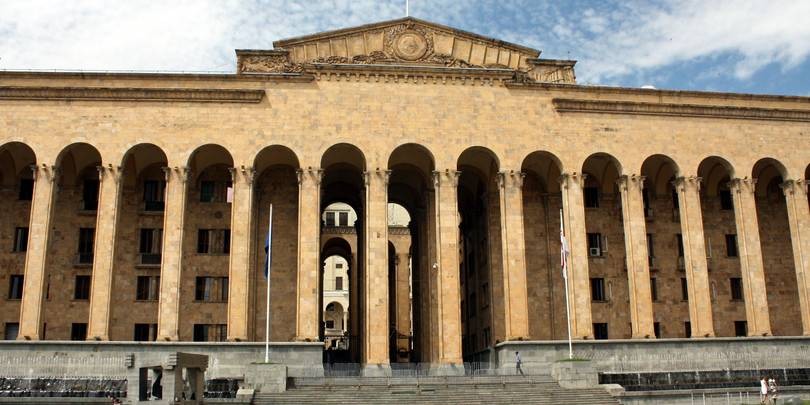საერთო ცხელი ხაზი +995 577 07 05 63


Photo: On.ge
The signatory organizations and activists address the reviewing process of the Draft Law “on the Rights of Persons with Disabilities” and call on the Parliament of Georgia to ensure full compliance of the legislative changes package with international obligations and the active involvement of the community of persons with disabilities in its discussion process.
The package of legislative changes was registered in Parliament in February 2020. Before its initiation, the multi-year law-drafting process by the Ministry of Justice could not ensure the proper involvement of persons with disabilities and organizations. The working process has not become a platform for large-scale review and discussion, which would serve as a basis for creating effective legislative mechanisms in response to the visions, challenges and recommendations made by the community members.
Along with the challenges in terms of involvement, the content of the Draft Law is also problematic. Despite some positive changes, the document, due to its declarative nature, largely fails to change the human rights situation of persons with disabilities, and, in some cases, sets a lower standard than the CRPD. The document also omits a number of issues that pose a significant challenge in the Georgian reality (e.g., the process of deinstitutionalization). Concerning the drafting process of the Law, as well as its substantive issues, a public statement and assessment were developed and submitted to the Parliament by persons with disabilities and organizations working on their rights.
As for the participation of the disability community in the Committee hearings, it was challenging that that information about the discussions was available only on the Parliament’s website and a variety of forms of information dissemination were not used. As a result, a relatively small number of people had information about the meetings. In addition, during one of the Committee hearings, the meeting hall was not accessible for wheelchair users, as a result of which the activist, with great obstacles, managed entered the hall in a manner detrimental to his dignity (several people had to pick up the wheelchair). The above factors significantly hindered the effective and active involvement of the disability community in the proces s.
During the first committee hearings, the risk of COVID-19 spreading increased significantly. Due to the importance of the Draft Law, disability activists and organizations have addressed the parliament. In the statement, they underlined the importance of postponement of the hearings due to the dangerous situation in the country and the fact that a significant portion of persons with disabilities belonged to the risk group. They requested resumption of proceedings only when the alarming period had passed and the risk of infection would no longer exist. The statement reiterated the need for effective and uninterrupted involvement of persons with disabilities in the review process of the Draft Law. Despite the above statement, on March 16, the Human Rights and Civil Integration Committee reviewed the Draft Law. There was indeed an opportunity for persons with disabilities to ask questions through particular electronic means, however, this format cannot be regarded as a mechanism for discussion, exchange of views and effective involvement of the community in the process.
At the same time, it should be emphasized that a video conference was held on March 18 in connection with the Draft Law, which was attended by members of the disability community, representatives of organizations working on their rights and MP Rati Ionatamishvili. Clearly, during one video conference, the Draft Law and the accompanying legislative package could not be fully discussed, and there were expectations of additional meetings, as well as feedback on the positions and recommendations presented during the meeting; however, this meeting was not followed by another one.
On June 18, the Human Rights and Civil Integration Committee reviewed the Draft Law in a second reading without the participation of persons with disabilities. Although the information on the discussion was available on the website of the Parliament, given the needs of different groups, access to information through solely this form should not be considered as an effective mechanism for dissemination of information and it was necessary to use a variety of formats for this purpose. Additionally, it should be noted, that being at risk for COVID-19 infection essentially prevents persons with disabilities from attending committee discussions. Therefore, it is important that this factor is taken into account in the planning process of the hearing.
Given all the above, it is clear that one of the most important international standards has been mostly neglected - the principle of real and effective involvement of persons with disabilities in the governmental decision-making process. Therefore, we reiterate our readiness to cooperate with the Parliament and the Ministry of Justice and to participate in the working meetings, where we will have the opportunity to present our views and recommendations on the Draft Law in a detailed manner. Only active communication shall allow us to refine the document, ensure its full compliance with international standards and turn the Draft Law into an effective mechanism for protection of the rights of persons with disabilities. In addition, it is important to consider the challenges faced by persons with disabilities under COVID-19 pandemic, many of whom may not be able to physically attend discussions/meetings. We unequivocally acknowledge the importance of the future law in improving the human rights situation of this group; however, the draft should be adopted through the real and effective inclusion mechanisms for persons with disabilities, while taking into account the limitations under COVID-19.
Based on all the above, the signatory organizations and activists address the Parliament of Georgia with the following recommendations:
Signatory organizations and activists:
The website accessibility instruction